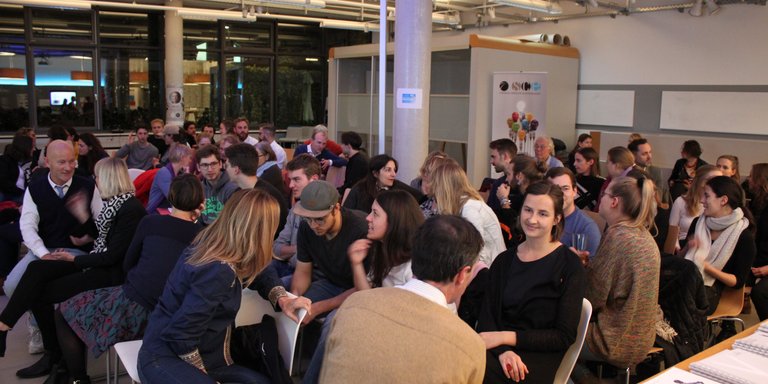
Report: Dialogue Forum special
"Munich on its way to becoming a Circular City"
17 November 2022, 18:00 - 20:30
Hochschule München
properties.trackTitle
properties.trackSubtitle
What does the concept mean in practice and what is the status of the initiative? The panelists at the Munich University of Applied Sciences explained contexts and answered our questions.

Building blocks of a circular economy
Lighthouse project
Especially in the construction sector, which is responsible for about 40 percent of all global CO2 emissions, the reuse of building materials would do a lot for the climate. Sascha Stremming, Head of Space Development at Impact Hub Berlin, explained how this can work. He and his team converted a warehouse into the CRCLR House according to the principles of circular economy and sustainability. "Circular building means sourcing as many building materials as possible from other demolition sites."
In addition, he says, it is important to build modularly so that one's own building materials can be recycled later on. "In our CRCLR House, everything is open-bolted and the electrical lines are not boarded up," he made clear. "With circular construction, you have to be willing to experiment and always expect that something can go wrong," Stremming said, while criticising the bureaucratic hurdles in Germany. In addition, he said, the costs are about 30 to 40 per cent higher than for conventional construction because more logistical effort is required and sustainable building materials are generally more expensive. "Unfortunately, unlike energy efficiency measures, there is no government funding for circular construction”, Stremming regretted.

Ground as a scarce resource
Architect and urban planner Roman Leonhartsberger made it clear that the Circular Economy must not only refer to material cycles, but also to the scarce resource of soil. For example, by using common areas differently. As an example, he cited the "Schulhaus im Birch" in Zurich-Oerlikon, which fulfils a central function for the neighbourhood by making rooms, sports facilities and outdoor areas available for general use. "That would not be possible in Germany, if only for insurance reasons," lamented Leonhartsberger, who works also as lecturer at the Munich University of Applied Sciences.
Because innovations are so important for building a circular economy, new ideas are in demand. One way to do this is through co-creation, creative collaboration, as promoted by Simon Göhler, Senior Consultant SCE Projects GmbH. He sees himself as a bridge builder between young people who want to try out their ideas and companies that want to promote innovation with their networks and financial resources. "Co-creation needs change and the necessary space to unfold," he explained. One of his main tasks is keeping the communication going between startup and company, preferably with the board itself, and promoting mutual understanding and trust. "Cooperation usually fails because of the established companies when they don't feel understood or lose interest," he knows from experience. In addition, he says, you have to establish a culture of making mistakes and should not secure everything ten times before starting a project.

New life for discarded textiles
Anna Diermeier relies on cooperation with companies with her start-up ZURÜCK Zero Waste. She gives discarded textiles, for example from the hotel industry or cuttings from industry, a new use as aprons, bags, carrier bags or tea towels. In this way, the textiles do not end up in the rubbish, but are returned to the cycle of recycling. "Change management needs enthusiasm, and you should always focus on the benefits, otherwise it is difficult to convince people," Circular Economy expert Langer is convinced. The benefits of a circular economy for Munich are obvious. It is an elementary building block on the way to climate neutrality, which Munich is striving for by 2035. And because more and more start-ups are discovering the topic of the circular economy, the chances of achieving this goal with many new ideas are not bad.
30 November 2022
*******************************************************
Programme
- Panel discussion - Circular City in Dialogue
- Input Session - Circular City in Practice
- Networking - Circular City, presentation of Munich initiatives
Welcome
- Prof. Dr. Klaus Sailer, Chair, Strascheg Center for Entrepreneurship
- Renate Bleich, Chair, Munich Re Foundation
Panelists
- Günther Langer, Department for Climate and Environmental Protection, Circular Economy Division, City of Munich, Germany
- Roman Leonhartsberger, architect and urban planner, pan m & lecturer at the Faculty of Architecture, Munich University of Applied Sciences
- Sascha Stremming, Head of Space Development Impact Hub Berlin + CRCLR House
- Simon Göhler, Senior Consultant SCE Projects GmbH Munich
Moderation
- Paju Bertram, Programme Management M:UniverCity
Venue
SCE Creative Hall, Heßstraße 89, 80797 Munich




